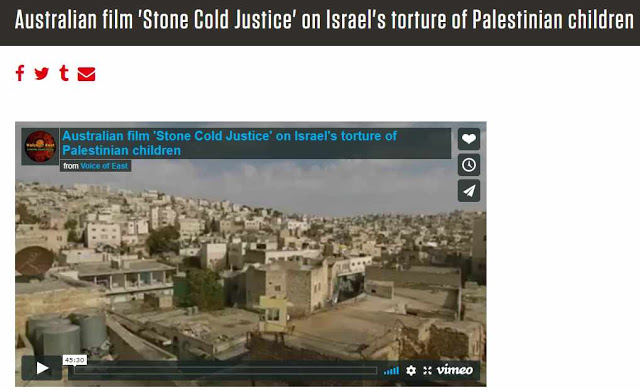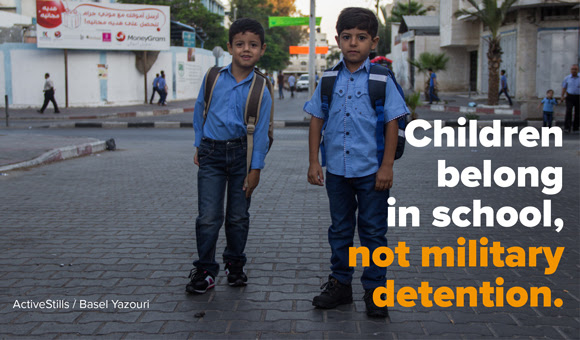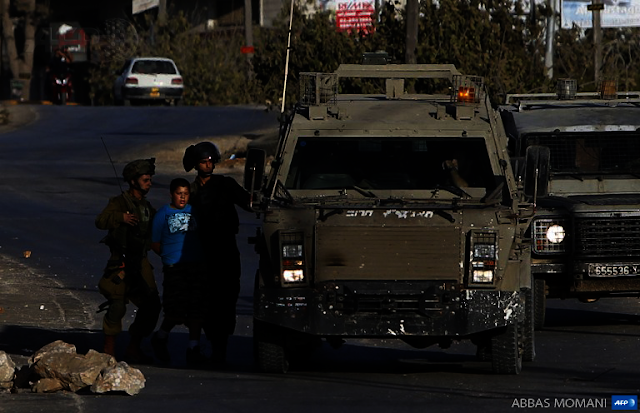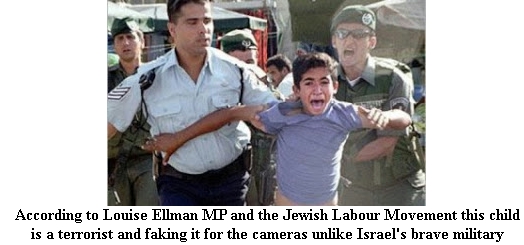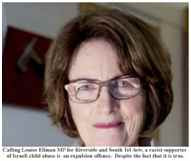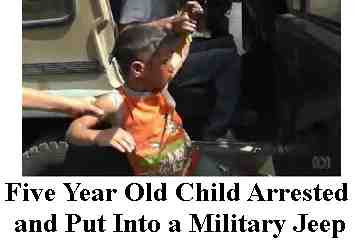
I was expelled from the Labour Party for ‘shaming’ Ellman – but she has no shame!
Israel’s Torture of Palestinian Children is Deliberate State Policy
There have been repeated and detailed descriptions of Israel’s torture and abuse, including sexual abuse, of Palestinian children. A group of Australian journalists produced a film ‘Stone Cold Justice,’ in the wake of a Report by UNICEF on Israel’s treatment of Palestinian children. I recommend you watch it.
On 6th January 2016 there was a
debate in the House of Commons on
Child Prisoners and Detainees: Occupied Palestinian Territories introduced by Sarah Champion MP who described how, in June 2012, a delegation of British lawyers published a report on children held in Israeli military custody. The Report was facilitated and funded by the Foreign and Commonwealth Office.
It found that Israel was in breach of six of its legal obligations under the UN convention on the rights of the child and two obligations under the fourth Geneva convention. The report also concluded that if allegations of abuse referred to the delegation were true, Israel would also be in breach of the absolute prohibition against cruel, inhuman or degrading treatment or punishment.
8 months after the UK report was published, UNICEF released its own assessment of the military detention system for children. After reviewing over 400 sworn affidavits from children detained in a system that allows the prosecution of 12-year-olds in military courts, UNICEF concluded that:
“the ill-treatment of children who come in contact with the military detention system appears to be widespread, systematic and institutionalized throughout the process, from the moment of arrest until the child’s prosecution and eventual conviction and sentencing”.
In February 2015 UNICEF issued an update to its original report and noted that allegations of ‘ill-treatment of children during arrest, transfer, interrogation and detention have not significantly decreased in 2013 and 2014”.
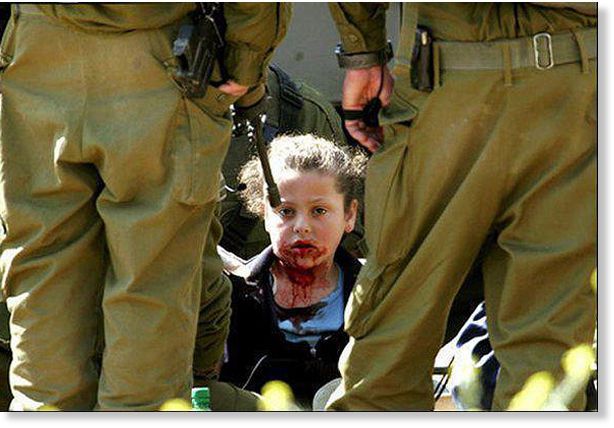 |
| Another terrorist |
Does my hon. Friend share my concern at the significant disparity between treatment of Palestinian and Israeli young people, including lack of legal representation and parental support, allegations of widespread abuse and having to sign confessions in Hebrew, among many others?
Or to put it bluntly, why is it that Israeli Jewish children and Palestinian children are treated differently?
‘my hon. Friend… will be aware that evidence from Military Court Watch suggests that 65% of children continue to report being arrested at night in what are described as terrifying raids by the military. Will she comment on that worrying fact?’
Louise Ellman, Labour MP for Liverpool Riverside and then Vice-President of the Jewish Labour Movement made 3 contributions, all of them in support of the Israeli military’ abuse of Palestinian children.
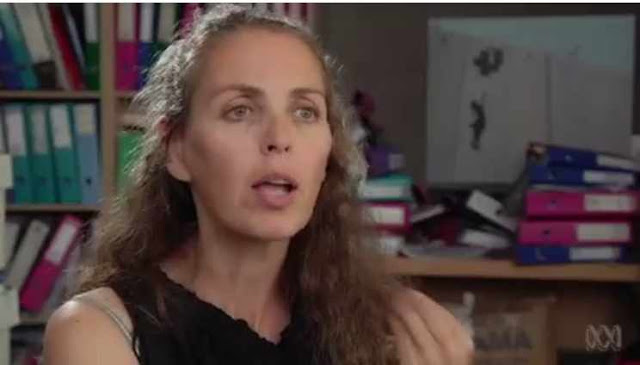 |
| Gabi Laski – Israeli Defence Attorney |
I therefore made the unremarkable observation that Louise Ellman was a supporter of Israeli military child abuse. Under the police state atmosphere created by Iain McNicol’s witchhunt, this was deemed an offence. In the words of Thomas Ogg, the Labour Party barrister who prosecuted my case, I had ‘shamed’ Ellman whereas I argued that the problem with Ellman was that she felt no shame. She uttered not one word of criticisim of the Israeli military, its detention of children, its beatings or its torture.
The testimony below needs no comment. Of course it could be brought to an end at a stroke if Israel videod all interrogations of child prisoners, it stopped the practice of seizing children in the early hours and it stopped the use of shackling and blindfolds. It does none of these things because it aims to create an atmosphere of terror.
Tony Greenstein
Legal Aid for Palestinian Kids in Military Courts
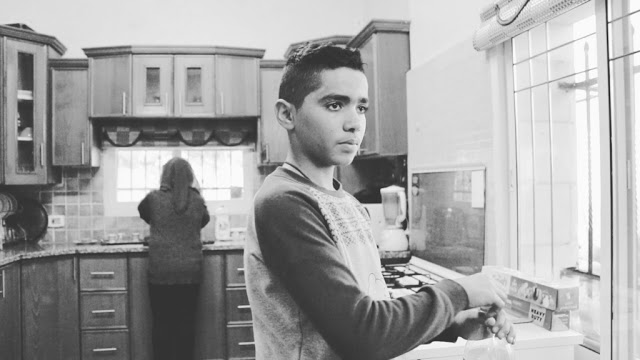 |
| Ahmad in kitchen beit ummar |
At around three a.m. on the morning of July 15, 2018, Israeli soldiers arrested Ahmad B., 15, from his house in Arroub refugee camp, near the southern West Bank city of Hebron.
Without explaining the reason for the arrest, soldiers blindfolded Ahmad and bound his wrists.
Compelling him to sit beneath soldiers’ feet on the floor of a military jeep, Israeli soldiers then began kicking and insulting the bound and blindfolded boy.
“They kicked me all over my body,” Ahmad told Defense for Children International – Palestine. “They insulted me, my mother, and my sister.”
At Etzion interrogation and detention center, Ahmad underwent a brief medical screening. He received a legal consultation prior to interrogation by phone, but he did not have a parent present during interrogation. Under military law, Israel does not provide Palestinian children the right to be accompanied by a lawyer during questioning, leaving children vulnerable to coercion.
“He threatened to withdraw my father’s work permit if I did not confess. I was very scared, so I confessed to throwing stones and Molotov cocktails.”
Ahmad told DCIP that the interrogator did not properly inform him of his rights. The interrogator ordered him to sign a document in Hebrew, without explaining it to him.
After this stress-inducing experience, Ahmad was strip searched, like most Palestinian child detainees. “They forced me to take all my clothes off, even my underwear,” Ahmad said.
For the next approximately eight hours, Ahmad was detained in a tiny, filthy cell. Then, the 15-year-old was transferred to the juvenile section in Ofer detention center, arriving around 9 p.m.
It is sad to say, but Ahmad’s detention is still not over. He remains in pre-trial detention while DCIP lawyers represent him before the Ofer military court.
Helps us fight for children like Ahmad by providing direct legal services to children trapped in an abusive system.
Between June 1, 2018, and August 31, 2018, DCIP attorneys closed 57 cases and received 46 new cases of Palestinian children prosecuted in the Israeli military court system. They also conducted 12 prison and detention center visits to monitor the conditions and treatment of children.
We are committed to serving these children in their moment of crisis and challenging the military court system that routinely denies children their basic due process rights.
Thank you
Between March 1, 2018, and May 31, 2018, Defense for Children International – Palestine attorneys closed 51 cases and received 48 new files of Palestinian children prosecuted in the Israeli military court system. They also conducted 8 prison and detention center visits to monitor the conditions and treatment of children.
Among the cases that stood out was 16-year-old Mohammad R. from Tel village in the northern West Bank. After a harrowing arrest experience, a DCIP attorney stood beside Mohammad and defended him before Israel’s Salem military court.
At around 4:30 p.m. on March 4, 2018, Mohammad was walking in the mountains of Tel with two of his friends. As he was walking, he tossed two stones in the air. The stones fell far away from the main road, the teen said.
When the three friends reached the main street, they were surprised to find Israeli soldiers asking them to approach them. Intensely afraid, the teens started to run but Mohammad fell and hurt his right leg.
Two soldiers and an officer quickly closed the distance between them. The officer kicked and punched Mohammad all over his body for about five minutes.
Limping on his swollen leg, Mohammad was forced to walk for about 100 meters (328 feet),to a military jeep. Nobody told him where he would be taken.
Soldiers then blindfolded Mohammad and bound his wrists together with plastic ties. He was forced to sit on the metal floor of the military jeep instead of a seat.
Disoriented and injured, Ahmad was interrogated without any legal counsel for around an hour and a half at Ariel Police Station. He was accused of throwing stones at the armored military jeep, based on soldiers’ testimonies.
“The investigator interrogated me without explaining my rights, such as my right to remain silent, and without the presence of a lawyer or a family member,” Mohammad told DCIP
He told them that he was just playing around, throwing stones in the air for fun. Mohammad said he was not targeting the military jeep and would not confess to something he didn’t do.
Mohammad was then transferred to Huwwara interrogation and detention center where he spent the night.
On March 6, he was transferred to the juvenile section in Megiddo detention center inside of Israel, in violation of international law.
Our attorney represented him in Salem military court and was able secure his release on March 23, on a bail of 1000 NIS (US$280).
Release on bail is rare for Palestinian children undergoing Israeli military detention. Typically, these children remain behind bars until, and even during, their trials.
Your
ongoing support helps us fight for children like Mohammad, by providing direct legal services to children trapped in an abusive system.
We are committed to serving these children in their moment of crisis and challenging the military court system that routinely denies children their basic due process rights.
(Photo: AFP / Abbas Momani/ 2014)
Among the cases that stood out was 14-year-old Obaida J., who was legally represented and acquitted by a DCIP attorney in Israel’s Ofer military court.
Obaida lives in Al-Aroub refugee camp where clashes with Israeli forces routinely take place due to its proximity to an Israeli watchtower. On October 1, 2017, Obaida and his friend were on their way to a local grocery shop when they came across clashes with Israeli soldiers.
He stood on the side to wait for the clashes to end, but was surprised that the soldiers ordered him to approach them.
“The soldiers tied my hands behind my back with a single plastic cord, blindfolded me and forced me to walk to the watchtower, about five to ten minutes away,” Obaida told DCIP.
After he sat next to the watchtower for around two hours, the soldiers put him in a military vehicle and transferred him to Etzion interrogation and detention center. There, he was interrogated without the presence of a lawyer or his parents. He was accused of throwing stones based on soldiers’ testimonies. He denied the accusations and did not confess.
Obaida remained in pretrial detention for 83 days at Ofer prison. During this period, he had seven court hearings in Ofer military court. DCIP’s lawyer Farah Bayadsi represented him in all court hearings and won his acquittal due to inconsistencies in the Israeli soldiers’ testimonies.
Obaida was released on December 22, 2017.
Ahmad A.,15, in his home after release
Among the cases that stood out was 15-year-old Ahmad A. from the West Bank town of Beit Ummar, northwest Hebron, who was legally represented by a DCIP attorney in Israel’s Ofer military court.
At around 2:30 a.m. on November 5, Israeli forces arrested Ahmad from his home in Beit Ummar. Israeli soldiers bound Ahmad’s hands to the front with three plastic cords, forced him to walk with them to the town center, and then blindfolded him.
Israeli forces transferred Ahmad to the Israeli settlement of Karmei Tzur, north of Hebron, where he stayed for a few hours, and then to Etzion interrogation and detention center. When he reached Etzion, he sat in the outside yard for about two hours blindfolded and hand tied.
Ahmad was interrogated by three different interrogators. All three accused him of throwing stones. He did not confess and maintained his innocence despite the physical assaults, shouting and intimidation that took place during the interrogations.
Ahmad received legal counsel over the phone prior to his the third interrogation. Interrogators provided him with a pile of papers to sign, he only signed the one paper in Arabic and refused to sign the others in Hebrew — a language he doesn’t understand.
Ahmad was then transferred to Israel’s Ofer military prison, near Ramallah, where he stayed until his release. Our attorney represented him in military court and secured his release on November 15, on 1,200 NIS (US$341) bail.
Bail is rarely granted in the Israeli military system and children typically remain behind bars as they await their trial. DCIP’s documentation found that only 13.5 percent of 297 cases closed by DCIP attorneys between 2012 and 2015 were released on bail.
“I was thinking about my family, friends and school. I was very happy when I was released,” Ahmad told DCIP.
It is because of your
ongoing support that DCIP attorneys are able to represent children like Ahmad. Children who are otherwise alone and at the mercy of a military court system that systematically denies them basic due process rights.
Thank you.
(Photo credit: DCIP / Yumna Patel & Akram Amin al-Wa’ra)
Mahmoud Q., 13, at Meir Hospital in Kfar Saba.
Among the cases that stood out was 13-year-old
Mahmoud Q., from the northern West Bank village of Jayyus, near Qalqilya, who went from a bystander to a multiple gunshot victim, under arrest, with an attempt to recruit him.
Our attorneys provided Mahmoud with legal advice prior to his interrogation and quickly secured his release. Their rapid intervention dissuaded Israeli military prosecutors from filing any charges.
Mahmoud told DCIP that he spotted some children burning a tire near Israel’s separation barrier while out on his family’s private land in the middle of the afternoon on July 23. He stepped back a little bit certain their actions will invite some trouble. Shortly after, Israeli paramilitary border police arrived on the other side of the separation barrier, and the children fled the scene.
“I stayed in the land because I did not do anything,” Mahmoud told DCIP. “One of the border policemen saw me and ordered me to stop, so I stopped and did not move at all. I was a short distance from them, but one of them shot me in the right leg with a live bullet.”
“I tried to run, but I could not because of the injury. He shot me again but this time in my left leg. I fell to the ground, and he fired another bullet, but it hit the ground and scattered into fragments. One of the pieces hit my right leg, and another one hit my shoulder.”
While Israeli forces were detaining Mahmoud, his parents arrived, but were threatened at gunpoint to leave. Border police crossed the barrier and wrapped his legs, but he continued to bleed profusely. The officers placed him on a stretcher in a military vehicle and transferred him to an ambulance. He arrived at Meir Hospital inside Israel around 45 minutes after he had sustained the gunshot wounds.
Admitted in critical condition due to severe blood loss, Mahmoud woke up the following day in the hospital’s intensive care unit and under the guard of two Israeli police officers. He remained under guard until July 31, during which the officers verbally abused Mahmoud and denied him family visitation.
Around 8 a.m. on July 27, while still hospitalized between surgeries, Mahmoud told DCIP that a police investigator questioned him while he was still in his hospital bed. The police interrogator did not inform him of his rights, and no lawyer or family member was allowed to be present. He accused Mahmoud of throwing stones and shouted at him, calling him a liar. Mahmoud denied all accusations, but signed a statement in Hebrew without understanding it.
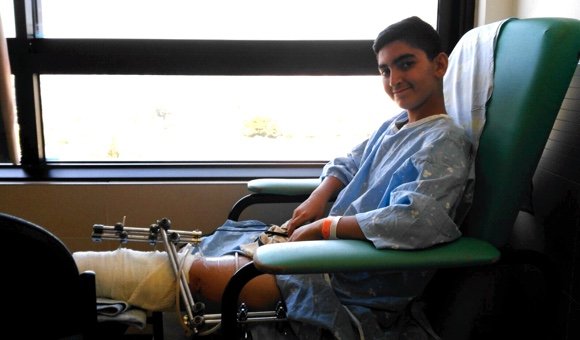 |
| NA.Injury. Mahmoud Q 14 Aug 2017 |
The interrogator then offered him 200 shekels (US$56) and a mobile phone, Mahmoud said, asking him to report information on children who throw stones in his village. Mahmoud refused.
“‘This phone is yours. The money too. But when you go home, I want you to stand for a while with the children who throw stones and breach security and public order, then call and tell us about them, so we could have them arrested,’ he [the interrogator] said,” Mahmoud told DCIP.
The same day, Israeli police asked Salem military court to extend Mahmoud’s detention in absentia. Our attorneys successful argued against the motion and secured his released on 4,000 shekel (US$1,115) bail and 5,000 shekel (US$1,395) third-party guarantee.
It is because of your
ongoing support that DCIP attorneys are able to represent children like Mahmoud. Children who are otherwise alone and at the mercy of a military court system that systematically denies them basic due process rights.






